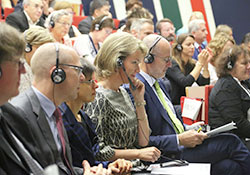European countries review progress and synergize efforts for control of vaccine-preventable diseases

University of Antwerp
Three days of discussion and sharing of experience among national immunization programme managers, WHO, partners and international experts on 1–3 September 2015 brought into full focus the challenges facing the European Region in the area of immunization and progress towards implementation of the European Vaccine Action Plan at national level. Over 130 delegates from 47 Member States of the European Region gathered in Antwerp, Belgium, to discuss remaining barriers to full immunization in Europe and the actions needed to achieve regional goals, such as elimination of measles and rubella and maintenance of the Region's polio-free status.
"The European Vaccine Action Plan (EVAP) embodies regional commitment to immunization, and this meeting offers immunization programme managers the chance to voice their opinions and experience, interact with each other and WHO staff and work together to translate EVAP strategies into national priorities and actions," said Dr Pierre van Damme, Professor of Vaccinology at the University of Antwerp and chair of the European Technical Advisory Group of Experts on Immunizaton (ETAGE), with reference to the interactive approach taken at the meeting. The format included included panels, small group discussion and question-and-answer sessions.
Polio outbreak preparedness – vigilance is vital in the European Region
In an extraordinary session on 4 September, WHO/Europe introduced new standard operating procedures (SOPs) for responding in the event of polio importation into a polio-free country. The SOPs were introduced in February 2015 by the Global Polio Eradication Initiative. All countries are encouraged to review and update their national outbreak preparedness and response plans in line with these new standards and definitions.
This additional session provided an opportunity for WHO to update participants on the current outbreak and response in Ukraine, following confirmation on 28 August of 2 cases of circulating vaccine-derived polio; the global switch from trivalent to bivalent oral polio vaccine (OPV), scheduled to take place in April 2016, was also discussed. This switch will affect 156 Member States worldwide, including 20 in the European Region (10 in which only OPV is currently used and 10 that use both OPV and inactivated polio vaccine (IPV) in their national immunization schedules).
Ensuring equitable access to vaccines
Her Majesty the Queen of the Belgians recognized the strategic importance of this meeting for regional control of vaccine-preventable diseases when she attended a keynote lecture by Dr Rudi Eggers of WHO headquarters and a panel discussion on approaches to ensuring equitable access for vulnerable and underserved populations. Country representatives related national experiences, such as a "tailoring immunization programme" (TIP) project in Sweden to identify barriers to vaccination in a Somali community and "European Immunization Week" activities in Romania for increasing vaccination coverage of the Roma population.
Dr Eggers explained that barriers to full coverage include parental mistrust or limited knowledge about vaccines, inconvenient or inequitable delivery of vaccines, cost and lack of trust in health services and providers. Family characteristics such as income level can also be an important determinant. Overcoming these barriers is a huge task for governments; the European Vaccine Action Plan therefore proposes a set of actions at national level to ensure that no person is missed.



